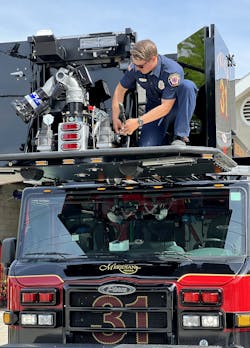I have found myself examining the nature of our work and its value. For many professions, at a very basic level, a job is a collaboration between workers and producers to fulfill a consumer’s needs. I’m not sure that this construct applies to the fire service. This basic mindset is plagued in generating apathy and creates a culture of wastefulness, emptying the fire service profession of its worth. As public servants, if we look beyond serving our community, there’s an equally rewarding and valuable dichotomy that’s found in serving the work. An opportunity exists to invest our energies for the good of the work itself, thus perfecting our profession.
Fire and emergency services are a necessity
Although the world is filled with opposing worldviews, shortcomings, turmoil and transition, the fire service represents a pattern of action that brings about hope and safety. Our service to communities is defined as being protectors of the public, whether risk-reduction specialists, EMS providers or emergency responders.
Many fire service professionals consider themselves students of the craft. To be a student connotes a dedication to learning. It’s through this process that we experience what it means to serve the work. One of the greatest leadership books ever written is Shel Silverstein’s “The Giving Tree.” The book captures the essence of serving the work. The giving tree—as a noun in the book—is committed to service to others and doing so with enthusiasm, because there’s meaning in the practice of patience and perseverance.
The motive to work
One common misgiving in the fire service and public safety is the shallow motivations that many express for doing the job. The most popular misaligned motivation is the almighty dollar. This motivation is driven by survival and has high appeal among people who have urgent needs that the money can satisfy.
According to Dorothy Sayers, who is the author of “Why Work? Discovering Real Purpose, Peace, and Fulfillment at Work: A Christian Perspective,” money should be the last motivation for working. Work has intrinsic value, and one’s well-being benefits from it, which is Sayers’ argument against working solely for money.
All work is an act of service, and public safety is a heroic act of service that is in direct service of the community. There is no greater good than working for the love of the work, or serving the work, according to Sayers.
The ultimate motivation should be doing the work for the sake of the work’s worth to the community, department and our peers. Monetary compensation should be an afterthought.
That’s easy for a fire chief to say, right? Well, not all fire chiefs or chief officers are the same.
Regardless of rank, those who find themselves rushing for a position at the front of the money train miss the mission and purpose of our work. Those who found compensation as the most rewarding aspect of the profession missed the mark. They managed to let the work serve them, not the other way around.
An expression and a reflection of oneself
Many have heard, “If you love what you do, you’ll never work a day in your life.”
I challenge all firefighters to treat their work as an expression of themselves, so work can be done for the good of the work itself. Public safety is a career that’s heavily dependent on efficient service to the community and its safety needs. Communities are fire departments’ clients, which makes community feedback vital to the growth of public safety as a necessity for every person in a community.
Countless jobs have an emphasis on serving the community, but it’s the business of the firefighter to serve the work. We should work for the sake of the craft, not solely for the sake of serving the community. If we work only to serve the community, Sayers writes, we will begin to bargain for rewards in the form of gratitude or compensation.
Serving the work should be a labor of love. When this is the case, we as a profession become resilient to the ebb and flow of public opinion and sentiment.
Feed the soul
Just because we as a profession aren’t fighting as much fire as our predecessors (which is a good thing), it doesn’t mean that we let apathy and rust settle into our organizations. If we are fighting fewer fires but still killing more than 100 firefighters per year, we aren’t serving each other, let alone the work. Fewer fires mean more opportunities to get it wrong under critical stress situations. Take personal pride and initiative in being excellent in your training, preparation and knowledge. Serve the work.
In the world of community risk reduction and prevention, there’s a tremendous opportunity. It’s easier to demonstrate loss in terms of monetary values versus the value of lives and property saved. Even so, prevention and risk reduction are the purpose of our craft and are the future of our profession. They are how we will continue to be relevant in communities. Creating safer, healthier, more prepared and resilient providers, organizations and communities is more than a preamble, it’s our mission. Serve the work.
Maybe it has been six months since your crew performed some serious ALS skills. Seek to perform well beyond “proficient.” Proficient, in many regards, is a low bar. Pursue excellence through opportunity and find personal value in being an exceptional EMS provider. Serve the work.
As a fire service professional, do you seize every personal growth and development opportunity? Or do you have the attitude that the department or district will serve you with the level of training and experience that you need? Pursue education and be an opportunity manager. Be willing to make personal investments, whether it’s your time, talent or treasure to become an exceptional professional. Serve the work.
Serve OUR work
These sentiments should be thought-provoking and allow you to critically analyze the value of doing anything without pouring your heart and soul into the endeavor. To do so conjures up the sentiment of Steve Prefontaine: “To give anything less than your best, is to sacrifice the gift.”
The value of the fire service isn’t disputed, but the worker’s service is being called into question. The call to action for firefighters to serve the work is studious and appeals to the basic nature of the fire service, a desire to do a worthwhile job. If your heart isn’t wholly invested, you will be unable to serve the work. Your profession should be seen as a gift to civilization, not a pursuit of greedy ambition.
Are you serving the work, or is the work serving you?
About the Author

Kristopher Blume
Kristopher T. Blume is the fire chief of the Meridian, ID, Fire Department and has more than two decades of fire service experience. He is an author, lecturer and independent consultant. Blume is a graduate of the Executive Fire Officer (EFO) program and is an instructor at the National Fire Academy. As a student of the fire service, he is focused on values-driven, mission-focused leadership for the profession. He is the author of "Carry the Fire: The Crucible of Leadership in the Fire Service".
